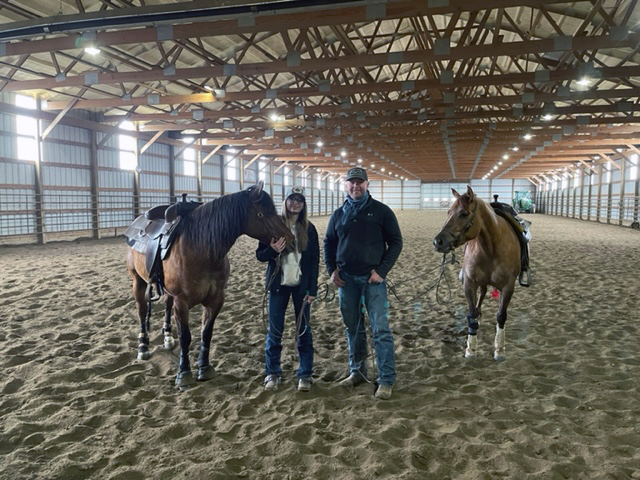Good ethics are key when buying or selling horses for customers.
By Kristin Pitzer

In the reining industry, horse buying and selling is a fact of life. Not everyone is familiar with the process, though, and that’s where an agent comes in. An agent’s job is to smooth the process for the parties involved, allowing them to enjoy what should be an exciting experience.
Anytime money is involved, there might be the temptation to handle it unscrupulously. When an agent acts unethically, it not only cheats their customers, but can put a blight on the industry as a whole. A successful agent, on the other hand, will be as transparent as possible, documenting everything to cover themselves and build a reputation of trust and ease.
We spoke with three NRHA Professionals who act as agents in horse sales to help share how they keep horse sales on the up and up, which helps horse owners have a positive experience and stay in reining instead of choosing another discipline—or leaving the horse industry altogether.
Advocating for the Customer
Investing money into a living animal comes with many risks, and that investment can quickly sour if a client feels they were slighted in the purchase. Clients go to agents because they tend to have the experience and time to advocate for them in a horse sale or acquisition. After all, said Ruben Vandorp, who offers a broad selection of horses for sale to his clients, most people don’t make other big purchases without someone more knowledgeable acting in their interest.
“I think it’s really pretty simple,” Vandorp said. “When I go buy a house, I take a real estate agent. When I go buy a used car, I take a mechanic. When I want to invest in the stock market, I use a stockbroker. All that is really an insurance policy, making sure you have the best person looking out for your interests that’s familiar with the business.”
The late Doug Carpenter, who started out training and showing, acted as a custom horse-buyer and agent for about 20 years until he passed in 2020. Throughout that time, he brokered some top performers such as Not Ruf At All and PS Mega Shine Chic. When Carpenter was enlisted to find a horse for a buyer, he worked hard to find one that was the perfect match for the rider’s talents and budget. He also scrutinized prospective mounts to discover any vices or negative qualities the buyer should be made aware of. His thoughts here came before we lost him.
“You have to do your due diligence,” Carpenter said. “You find out everything you need to know about the horse so you can tell the prospective buyer all the ups and downs of the horse. There’s always going to be one or two things you need to disclose with them. Whether a person likes it or not, I disclose everything. That’s all part of your research you do.”
Carpenter treats horses he’s selling the same way, disclosing everything he knows about the horse to potential buyers. That way, both the buyer and the seller can walk away satisfied because nothing is a surprise when they get home.
Researching horses takes a lot of time, and selling horses requires several steps, said Steve Ross, a trainer and judge who made acting as an agent the full focus of his business. The horse business is full of unwritten rules, he said, so most laypeople need someone else who can guide them through the process.
“A lot of people either aren’t familiar with the process or they’re not successful at it,” Ross said. “For one small fee, they can send it [a horse] to [an agent] and we can solve that problem for them quickly. That’s one of the things we promise. I think the biggest issue is a lot of times people buying a horse have less knowledge and less information than the person they’re buying it from, and that can lead to the buyer being taken advantage of. We try to use that the other way to benefit the customer.”
A customer who feels they were taken care of by an agent is more likely to go back to them in the future and steer family and friends toward them, too. Part of gaining that trust is disclosing everything to everyone involved, Ross said. When he’s brokering a deal, everyone gets copies of checks, bank transfers, etc. Keeping a paper trail on all the finances means both the buyer and seller will know the final purchase price and which fees have been paid where.
Communication is everything, Vandorp said. An agent should be completely upfront about his or her fees, and if there are any other arrangements involved, the buyer or seller needs to be made aware of that.
“I just believe in an open book. I like it simple,” Vandorp said. “It protects me, it protects the buyer, it protects the buyer’s agent. If something goes wrong—sometimes people did not get the dream horse they wanted, even though your intentions were good and you did all your homework—and people are upset, you’re going to wish you’d done everything by the book. You don’t want anything to come out later that they were unaware of because that will just throw gasoline on the fire.”
[sub] The Power of Transparency
The NRHA Professionals Code of Ethics mentions two items specific to acting as an agent. The first is “to fully disclose to customers the actual sales price and commissions involved in the sale or purchase of a horse.” In the past, before riders had the internet to connect them to buyers and sellers around the globe, agents generally were the link between them, which meant the buyer and seller often never met. This paved the way for some shady deals—if a horse sold for more than the amount the buyer was asking, for instance, the agent might decide to keep the extra cash for themselves, and the seller would be none the wiser.
To give his clients peace of mind, Carpenter doesn’t like to handle any of the money. Rather, he discusses finances with his clients, then allows the seller and buyer to disperse money instead of going through him.
“That takes any of the doubt away,” Carpenter said. “They know what they’ve got. I’m very, very big on full disclosure, and the money’s the No. 1 part of the deal.”
The second bullet point in the Code of Ethics is “to not charge or receive a monetary commission, or other renumeration constituting a commission, from both the buyer and seller of a horse.” The standard commission in the horse business is 10%, whether it gets paid by the buyer, seller, or split between both parties. Unethical agents might advertise a 10% commission, but then secretly charge both the buyer and seller for it. Hiding that the seller paid the commission in order to also bill the buyer for it is highly unethical, but if the two don’t communicate, neither will know they have been taken advantage of.
If both parties, however, agree beforehand to pay the same agent a commission, as long as it is fully disclosed, there shouldn’t be a problem. Not everyone believes one agent can speak for both sides in the arrangement, though.
“I don’t think you can accurately represent both sides. That’s like hiring one attorney to serve two different people,” Ross said. “A commission is not a bonus; it’s an amount that’s earned. I feel very strongly that we earn our commission through education and honest representation, and the customer gets tremendous value when they deal with us because they don’t just get the horse—we’re also able to help them. That’s the key thing because we want long-term, happy customers.”
Vandorp said in today’s market, it’s only a matter of time before an unscrupulous arrangement is discovered. Thanks to social media, buyers and sellers often have been in contact even before the agent has had a chance to see the horse in person.
“Now, by the time I have tried a horse, driven out of the driveway, and turned onto the interstate, the buyer and seller are Facebook friends,” Vandorp said. “They’re so far ahead of me and talking to each other. So whatever game you’re trying to play, you’re going to get caught, and it’s just not worth it. The world’s gotten a lot smaller, and everybody knows everybody.”
Full disclosure is the best way to build trust and maintain a good reputation as an agent. The horse world is a small place, and if an agent tries to hide even a small extra fee, it’s likely it will come out at some point in the future.
“I believe if you’re honest, you have your cards on the table, and you do a good job for your people, it’s going to come back to you way more than a little percentage,” Vandorp said.
An agent who is completely transparent and discloses everything about a horse will prove to have their clients’ best interests at heart. Due to the nature of dealing with live animals, not every transaction will turn out positive, but as long as the agent can prove they did everything they were supposed to, their reputation should remain intact.“That’s the right way to do it,” Carpenter said. “Not everybody is going to be happy all the time, but you have to be able to walk away and say you did everything you could to do it right. If you just do it right and treat people fairly, you’d be surprised how few problems you get into.”



